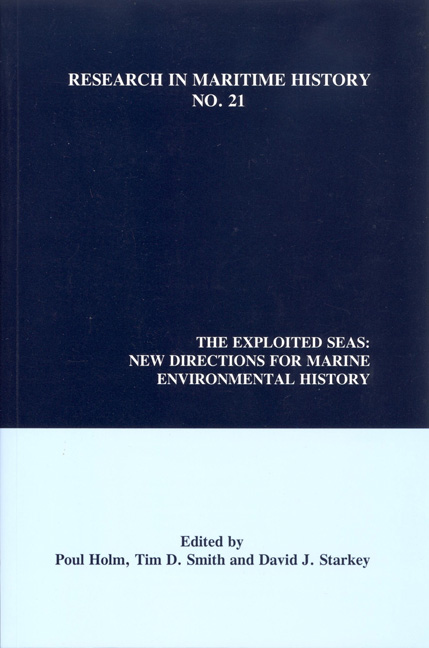Book contents
- Frontmatter
- Contents
- About the Editors
- Contributors
- “Introduction”
- Contributions
- “The Newfoundland Fisheries, c. 1500-1900: A British Perspective”
- “Testing Ecological Models: The Influence of Catch Rates on Settlement of Fishermen in Newfoundland, 1710-1833”
- “Nineteenth-Century Expansion of the Newfoundland Fishery for Atlantic Cod: An Exploration of Underlying Causes”
- “Status and Potential of Historical and Ecological Studies on Russian Fisheries in the White and Barents Seas: The Case of the Atlantic Salmon (Salmo Salar)”
- “The Danish Fisheries, c. 1450-1800: Medieval and Early Modern Sources and Their Potential for Marine Environmental History”
- “Historical Approaches to the Northern California Current Ecosystem”
- “Potential for Historical-Ecological Studies of Latin American Fisheries”
- “The South African Fisheries: A Preliminary Survey of Historical Sources”
- “The Potential for Historical Studies of Fisheries in Australia and New Zealand”
- “Examining Cetacean Ecology Using Historical Fishery Data”
“Potential for Historical-Ecological Studies of Latin American Fisheries”
from Contributions
- Frontmatter
- Contents
- About the Editors
- Contributors
- “Introduction”
- Contributions
- “The Newfoundland Fisheries, c. 1500-1900: A British Perspective”
- “Testing Ecological Models: The Influence of Catch Rates on Settlement of Fishermen in Newfoundland, 1710-1833”
- “Nineteenth-Century Expansion of the Newfoundland Fishery for Atlantic Cod: An Exploration of Underlying Causes”
- “Status and Potential of Historical and Ecological Studies on Russian Fisheries in the White and Barents Seas: The Case of the Atlantic Salmon (Salmo Salar)”
- “The Danish Fisheries, c. 1450-1800: Medieval and Early Modern Sources and Their Potential for Marine Environmental History”
- “Historical Approaches to the Northern California Current Ecosystem”
- “Potential for Historical-Ecological Studies of Latin American Fisheries”
- “The South African Fisheries: A Preliminary Survey of Historical Sources”
- “The Potential for Historical Studies of Fisheries in Australia and New Zealand”
- “Examining Cetacean Ecology Using Historical Fishery Data”
Summary
Abstract
This paper considers the importance of fishing within Latin America, and the region's contribution to the world's exploitation of marine animal populations. It reviews the pre-conquest, intra-regional and late twentieth-century export fisheries, questioning their relative absence in contemporary historiography. It then considers the historical analysis of Peruvian fisheries development in greater detail, citing the economic and political impediments to their development prior to their exponential growth in the 1950s and 1960s, and the factors underlying their collapse and volatility in the 1970s nd 1980s. Using the Peruvian case study, the paper evaluates the potential or environmental history and historical ecological studies in this region using historical time series of fishery and ecological data. It concludes that there is considerable scope to further our understanding of the historical development of living marine resource exploitation in the region, and specifically in the Humboldt Current ecosystem, through historical and ecological multi-disciplinary studies.
Introduction
The exploitation of natural resources has defined Latin American development. While the region is endowed with unique and valuable marine resources, agriculture, forestry and mining have established the strongest links with the world economy. Fisheries, though, have played an important role in transforming and defining the region during the twentieth century as that industry expanded from its initial Northern hemisphere concentration into the Southern hemisphere. However, rapid fisheries development throughout Latin America in the pursuit of economic development has often engendered and exacerbated overexploitation and conflicts between resource users without necessarily improving living standards or food security.
While fishing was an important component of pre-conquest subsistence and intra-regional trade, its significance in colonial and post-independence states was relatively diminished. However, the second half of the twentieth century saw the region's ascendance as a major fisheries producer. This advance was led by the extremely rapid growth of industrial fishing in Peru, with its anchovy fishery having become the largest single-species fisheries in the world in the late-1950s. This fishery, however, had collapsed by the early-1970s due to a combination of overfishing, ineffective management and anomalous climatic conditions. Here we first review the pre-conquest, intra-regional and late twentieth century export fisheries in Latin America. We then consider the historical analysis of Peruvian fisheries development in greater detail, with the objective of increasing our understanding of past Southeast Pacific marine animal populations.
- Type
- Chapter
- Information
- The Exploited SeasNew Directions for Marine Environmental History, pp. 141 - 166Publisher: Liverpool University PressPrint publication year: 2001



